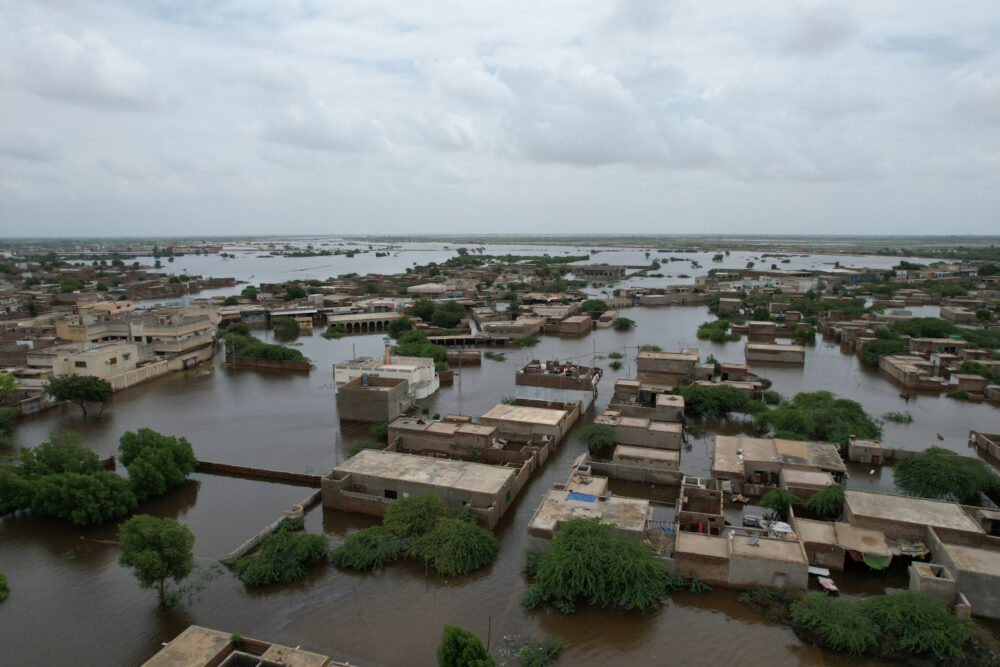This summer’s floods in Pakistan were particularly violent and severely affected the country’s most vulnerable populations. In order to provide reliable information as part of the emergency humanitarian response, Fondation Hirondelle and Tribal News Network (TNN), its media partner in Pakistan, launched the four-month project “Media to support flood response and information to affected populations in Pakistan” on 1 November. This project is supported by H2H Network.
After this summer’s disaster, the situation is alarming. The floods, which were most pronounced in rural areas of Pakistan, have severely affected the country’s most vulnerable populations, namely pregnant women, the elderly and those with limited mobility. The waters also destroyed almost all of about 19,000 schools, leaving children facing an education crisis. Nationally, the impact of the floods on poverty is alarming: the World Bank has released a new figure indicating that an additional 9 million people, or more than 40% of the population, are at risk of falling into poverty due to climatic disasters.
It is in this emergency context that Fondation Hirondelle, with its partner Tribal News Network (TNN), the support of H2H Network and more than 30 offline and online media partners, is undertaking the production and dissemination of vital content and in-depth reporting, as well as expanding its collaboration with the wider humanitarian community in 60 districts in the four provinces of Pakistan (Balochistan, Khyber Pakhtunkhwa, Punjab and Sindh). The aim of the project, supported by H2H Network, is to provide essential information to flood-affected populations across the country. Pakistan currently lacks trained journalists in crisis response reporting and media.
The contribution of TNN media to fill this gap is the training of journalists: “We are in the process of training journalists in these regions and producing content in radio and other media. We have to train 70 journalists, some 24 journalists would be from the radio and will produce 12 one-hour radio programmes in the provinces of partner media that will broadcast the content in several languages. People in the affected areas will be able to discuss and debate on relevant topics close to their lives,” explains Said Nazir, director and co-founder of TNN.
The trainings and the process of creating stories will allow TNN media to think about more qualitative and community-oriented content: “How to report better? What elements should be kept in mind? And how can we make local authorities more accountable and give guidance to local communities to have an inclusive approach that does not marginalise groups, such as women, to be heard in such situations? There has to be an aspect that focuses on solutions and not just on problems, because listeners need solutions and support. The second thing that reporting should facilitate is connecting communities and government, and sustaining responses,” says Nazir.
To this end, the project will include the production of daily and weekly situation updates, public service announcements and radio talk shows, online reporting and multimedia, television and print content. Media content will also include communication between the affected population, aid workers and responsible authorities, and the production of key messages in local languages to reach the largest number of people, including vulnerable groups (such as refugees, women and the elderly).
Initial training and ongoing supervision will be provided throughout the project. In this regard, the director of TNN highlights the importance of trained journalists in several media: “Among these 70 journalists, there should be some from other media, like print, online TV. So they should produce 80 written stories that will be broadcast in the peace media across the 4 provinces”. The messages will be disseminated through radio stations, online media of Digital Media Alliance Pakistan (DigMAP), TV, print media, as well as social media (Youtube, FB, existing WhatsApp groups), which have been identified as the most effective communication channels to reach an ever-wider audience.

